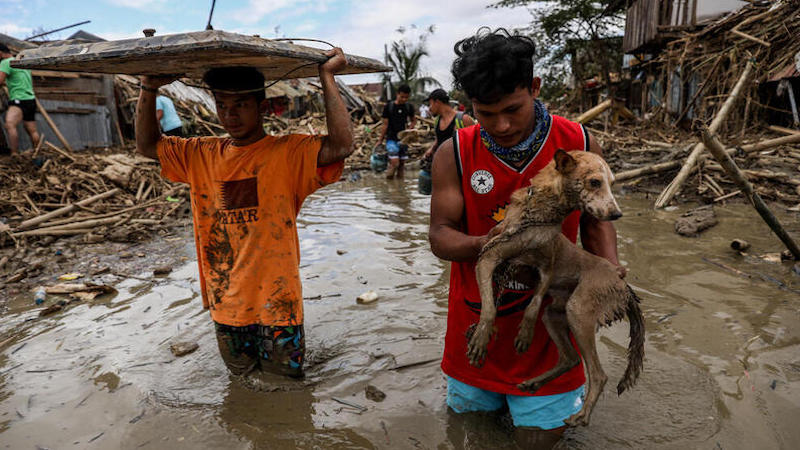A pause on loan repayments can give vulnerable countries breathing space when hit by a natural catastrophe
The World Bank will start offering a pause in loan repayments to the “most vulnerable” countries when they are hit by catastrophic events including climate-related disasters.
The bank’s new chief Ajay Banga unveiled the measure at a global leaders’ summit in Paris as part of a raft of tools to help nations dealing with a crisis.
He said this will allow countries to “focus on what matters to their leaders when a crisis hits and stop worrying about the bill that’s going to come”.
Many countries at the forefront of the climate crisis already have some of the highest levels of debt distress, meaning they are unable to meet financial obligations.
Rich nations pledge $2.5 billion for Senegal’s renewable rollout
Today’s announcement marks an important victory for Barbados prime minister Mia Mottley and her Bridgetown agenda, as her campaign to reform global finance for the climate era is known.
Step forward
Speaking at the gathering she helped convene with French President Emmanuel Macron, Mottley hailed recent progress. “Nine months ago, no one was speaking about natural disaster clauses,” she said. “Now, we have people wanting to recognise the wisdom of it because countries do need to pause debt payments if they’re going to house and feed people who are victims of a climate crisis”.
In a press release, the World Bank said it would initially trial the clause with its most vulnerable borrowers, hoping to expand it to all clients in the future. It also announced other measures including options for countries to redirect a portion of their funds for emergency response and the provision of new types of insurance.
About three-quarters of developing countries’ debt is to the private sector. About a quarter is to multilateral development banks like the World Bank and less than a fifth is owed to governments, mainly China and the big developed nations.
Dileimy Orozco, senior policy advisor at E3G, told Climate Home News that debt suspension “is not the holy grail, but it is a step forward as it will give countries some breathing space in case of disaster”.
Separately, the United Kingdom, the United States and France have announced plans to offer similar debt relief measures to certain borrowers.
The UK’s export credit agency is in discussion with twelve countries in Africa and the Caribbean to allow them to defer debt repayments if they are hit by climate catastrophe, the government said today.
Fossil fuels, planes, ships and shares – What will be taxed for climate funds?
The US plans to begin incorporating disaster-related debt clauses in the bilateral lending done through its export credit agency by the end of the year. The measure will be applied “on a transaction-by-transaction basis, looking at where they are most needed”, Patricia Pollard, a US Treasury official, told a panel discussion in Paris.
France is also working towards integrating debt suspension clauses in the concessional loans disbursed by its development agency, the country’s development minister Chrysoula Zacharopoulou announced on Thursday.
Debt traps
Most countries facing a high risk of climate disasters are already “drowning in debt”, according to an analysis by the campaigning group ActionAid. Debt distress is affecting, for example, Mozambique and Malawi, where the passage of Cyclone Freddy killed thousands of people and caused $1.5 billion in damages earlier this year.
Carbon credits touted as saviour of coal-to-clean energy deals
Without relief measures, natural disasters can easily push vulnerable countries into a costly debt spiral, the report said, as they have to keep paying back their existing loans while taking on even more debt by borrowing the money needed to respond to the crisis.
Debt piles can rise quickly. Covering the costs of catastrophe is expensive for countries that have to pay more to borrow money because of the perceived risk of lending to them. The average cost of borrowing for a group of 58 climate-vulnerable nations is 11%, according to a study by the Boston University Global Development Center. This is much higher than borrowing costs for developed countries.
Breathing space
Pakistan has been particularly vocal about the risks of a climate “debt trap”. The South Asian country was pushed to the brink of default last year. While flooding affected nearly a third of its territory last year, it owed billions of dollars in debt repayments.
Its former climate minister Malik Amin told Climate Home the World Bank initiative “could help Pakistan in creating badly needed fiscal
Read More

